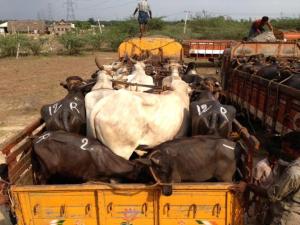Publication: The Indian Republic
Date of publication: June 15th, 2014
Link: Link to The Indian Republic article
“ The greatness of a nation and its moral progress can be judged by the way its animals are treated.” – Mahatma Gandhi
The greatness of a nation and its moral progress can be judged by the way its animals are treated.” – Mahatma Gandhi
The story of Bruno*
Bruno was a beautiful 2 year old Labrador retriever dog. His human family consists of four people who loved him very much, a software engineer couple and their two young daughters- sixteen year old Isha (name changed) and ten year old Ela (name changed) who lived in a gated community in Hyderabad. One day, Ela came home to Bruno lying by their doorstep in a pool of blood, a large part of his tail missing and two of his paws badly crushed. In a state of total panic, she shrieked and started crying. Thankfully, her neighbors rushed to the spot and took Bruno to the hospital. After an hour-long surgery and four days in the hospital, Bruno survived but was never able to walk normally again. Bruno was never the same again, and how could he be?
It turned out that a group of three depraved, heartless men aged between 25 and 30, who lived in the same gated community sadistically took turns running Bruno over with a brand new scooter that one of them bought recently. It was their perverted idea of fun. When I first heard of this story, my reactions were visceral. My blood boiled and my heart bayed for their throats. However, what followed was even more heart-breaking.
 We Indians pride ourselves on our history. India, after all, is the land of the Buddha – the enlightened one who preached ahimsa (non-violence) above all else. India is the land of Mahatma Gandhi- the warrior who brought the British Empire to its knees without shedding a single drop of enemy blood. Surely, in India, the tormentors of Bruno would be punished, and punished in accordance to the severity of their crime. When Bruno’s family approached the police and went to court, the three criminals plead guilty to animal cruelty. What happened next was a travesty and a blot on the conscience of any civilized nation. The judge, bound by the toothless Prevention of Cruelty to Animals Act (1960), levied the maximum punishment on the three men – a fine of all of Rs 50! (Chapter III, Clause 11 (o), Prevention of Cruelty to Animals Act of 1960)
We Indians pride ourselves on our history. India, after all, is the land of the Buddha – the enlightened one who preached ahimsa (non-violence) above all else. India is the land of Mahatma Gandhi- the warrior who brought the British Empire to its knees without shedding a single drop of enemy blood. Surely, in India, the tormentors of Bruno would be punished, and punished in accordance to the severity of their crime. When Bruno’s family approached the police and went to court, the three criminals plead guilty to animal cruelty. What happened next was a travesty and a blot on the conscience of any civilized nation. The judge, bound by the toothless Prevention of Cruelty to Animals Act (1960), levied the maximum punishment on the three men – a fine of all of Rs 50! (Chapter III, Clause 11 (o), Prevention of Cruelty to Animals Act of 1960)
Animal Cruelty in India
Animal cruelty is fairly common in the country. Animal cruelty can broadly be classified into two types:
1) Wanton, sadistic cruelty: This type of cruelty is perpetrated by psychopathic and sadistic people without any apparent reason. It could range from relatively benign incidents such as children throwing stones at dogs or cows to horrifying instances of brutality such as the mutilation of pets and starvation of house animals. Reports indicate that instances of wanton cruelty are on the rise. With the penalty for animal cruelty being a paltry Rs 50, there is no deterrent to such mindless behaviour.
2) Cruelty for commercial reasons: In an effort to cut corners, greedy businessmen often perpetuate untold cruelty on helpless animals. Examples:
a) Over-stuffling cattle into trucks: It is common in India to see 15 cows being forced into a truck that can only hold 7-8 while they are transported hundreds or even thousands of kilometres by road. Cows are often beaten, their legs broken and made to stand on top of each other for days together without food or water – all to save they cruel owners a little bit of money. When caught, the truck drivers plead guilty to animal cruelty and pay the paltry Rs 50 fine that is mandated under the PCA Act. Says Alokparna Sengupta, a prominent animal welfare activist based in Hyderabad, “The treatment of cattle during the transportation process brings tears to my eyes every time I think about it. The worst part is that even when the truck-drivers are caught ill-treating cattle, we cannot have the cattle seized under existing laws. The cattle are given right back to the truck drivers after they pay the fine.”
An estimated 150 million cattle are slaughtered every year in India (Source: The Independent) and beef of about 1.8 million tonnes was exported in 2013 (Source: Reuters) . Imagine how cruelly most of them are treated for days together while they are transported to the slaughterhouses.
 b) Rearing of poultry in tiny battery cages: Battery cages are cages designed in such a way that hundreds of egg-laying hens are stuffed into a series of cages in such that each hen has less space than one A4 size sheet of paper to live its entire life in. Hens in battery cages cannot move and undergo untold suffering throughout their lives. An estimated 200 million hens i.e. 70% of all of India’s hens live in battery cages (Source: WorldPoultry). Technically, battery cages violate existing animal cruelty laws. The Animal Welfare Board of India even issued advisory asking states not to allow the use of new battery cages and to discontinue the use of existing ones after 2017. However, it is unclear whether this advisory is binding and whether it will be enforced.
b) Rearing of poultry in tiny battery cages: Battery cages are cages designed in such a way that hundreds of egg-laying hens are stuffed into a series of cages in such that each hen has less space than one A4 size sheet of paper to live its entire life in. Hens in battery cages cannot move and undergo untold suffering throughout their lives. An estimated 200 million hens i.e. 70% of all of India’s hens live in battery cages (Source: WorldPoultry). Technically, battery cages violate existing animal cruelty laws. The Animal Welfare Board of India even issued advisory asking states not to allow the use of new battery cages and to discontinue the use of existing ones after 2017. However, it is unclear whether this advisory is binding and whether it will be enforced.
What the Supreme Court says
As part of a landmark judgment this May in the case of Civil Appeal No. 5387 OF 2014 (SLP No.11686 of 2007), the Supreme Court of India re-affirmed the basic rights of animals and said that it expects the Parliament to amend the PCA act to “provide an effective deterrent to achieve the object and purpose of the Act”. It further sought “adequate penalties and punishments” for violations of the Act. What is most significant about the judgment is that it sought the elevation of the rights of animal to that of constitutional rights to “protect their dignity and honour”. It further directed the government to take disciplinary action against erring officials.
The implications of this judgment are profound. It effectively places the responsibility of amending the existing laws on animal welfare on the Parliament and of effectively enforcing them on the government. Animals and animal rights activists across the country will forever be indebted to Justice K.S. Radhakrishnan for such a visionary judgment.
Top policy changes sought
Animal rights activists seem to broadly agree that the top 3 policy changes that need to be implemented immediately are:
- Increasing the penalty for animal cruelty from the existing Rs 50 to a more substantial sum, say Rs 50,000 depending on the severity of the offense.
- The amendment of legislation to make serious animal cruelty offenses cognizable, to empower enforcement authorities to seize animals that are being treated cruelly (e.g. cattle)and to arrest offenders.
- Increasing the manpower and funding available to the government bodies implementing animal welfare laws.
The way forward
The present laws against animal cruelty (Prevention of Cruelty to Animals Act, 1960) are outdated, ineffective and poorly enforced. We need a complete overhaul of the legislation in line with the directions and observations of the Supreme Court.
Says Jayasimha Nuggehalli, Managing Director of Humane Society International (India),“The reform of the existing laws is a great first step towards the welfare of animals, but they should also be accompanied by better funding and more manpower for government bodies that work to implement these laws. We have high hopes on Modiji that he will help overhaul the system to help protect the interests of animals.”
Experts feel that it is equally important to create awareness among the general public about the issues concerning animal welfare and for the general public to be responsive to the animals around them. Says Alokparna, “Animals need the people of India to step up and speak out for them. Whenever someone sees an animal being abused, they should report it. If they cannot report it, they should call a local animal welfare NGO and inform them. This will go a long way in making India cruelty-free.”
*The story of Bruno is based on real life events. Image Credits – Wikipedia, All-Puppies.com, The Hindu, Farm-Sanctuary, VeganRabbit and others.

